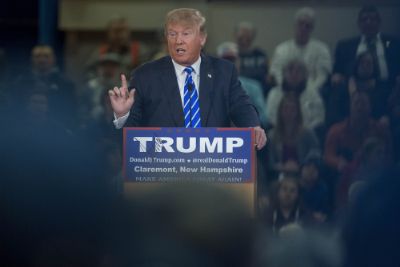Investors, Look Before You Act on Trump’s Trade Rhetoric: Gadfly

Japan’s Topix rallied as much as 5.5 percent Thursday while the Kospi Index rose 2 percent. Brazil’s Ibovespa, meanwhile, closed 1.4 percent lower on Wednesday and shares in Mexico dropped 2.2 percent.
Topix intraday gain
+5.53%
That’s topsy-turvy, considering the biggest component of the Topix is Toyota Motor Corp., which could face a backlash in a Trump administration. Consumer discretionary stocks, which include carmakers, and industrial companies comprise more than 40 percent of the benchmark, and both are likely to face higher export barriers.
South Korean automakers are treading even more dangerous waters given a lot of the vehicles that they sell in America are produced elsewhere. What’s more, Samsung Electronics Co. accounts for 18.7 percent of the Kospi, and Trump has pledged to force Apple Inc. to produce the iPhone in the U.S.
True, Trump is said to use a Samsung Galaxy smartphone, but as Bloomberg Intelligence analyst Caitlin Webber pointed out, that won’t exempt the company from facing higher costs to sell its handsets in America.
In fact, almost 55 percent of the Kospi is made up of industrial, consumer discretionary, and information technology firms, many of which rely heavily on exports to the U.S.
Some 23 percent of Mexico’s Bolsa, by contrast, consists of two companies that depend mainly on the local market. Coca-Cola bottler Fomento Economico Mexicano SAB has diversified into convenience stores and beat estimates in its latest quarterly report. Its products generally don’t suffer too much in an economic downturn and, if anything, stand to gain if more Mexicans return home. A similar logic applies to America Movil SAB, Latin America’s largest local mobile operator.
Then there’s Cemex SAB, which comprises almost 8 percent of the gauge. Mexico’s biggest producer of cement has plants in America and would be a winner from Trump’s promise to rebuild infrastructure. In other words, one third of the Bolsa could actually see better earnings thanks to the President-elect.
Brazil is a similar case. Raw materials and energy companies are 30 percent of the index and if roads and hospitals are being built in the U.S., the commodities they sell will be in high demand. Another 34 percent comprises financial firms, which depend largely on domestic business.
Investors tend to react on instinct when something as unexpected as the victory of Donald Trump happens. Eventually, as they look more closely, reason prevails.
This column does not necessarily reflect the opinion of Bloomberg LP and its owners.
To contact the author of this story: Christopher Langner in Singapore at clangner@bloomberg.net To contact the editor responsible for this story: Katrina Nicholas at knicholas2@bloomberg.net
copyright
© 2016 Bloomberg L.P





No Comment